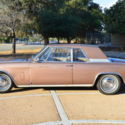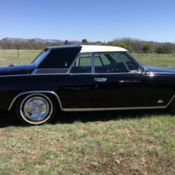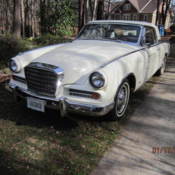R2 Supercharged 1964 Studebaker Gran Turismo R2 Super Hawk Avanti Low Miles 2 dr
- Condition: Used
- Make: Studebaker
- Model: GT Super Hawk
- SubModel: R2 Supercharged
- Type: Coupe
- Trim: R2 Supercharged
- Doors: 2
- Year: 1964
- Mileage: 52,500
- VIN: 64V19830
- Color: Black
- Number of cylinders: 8
- Fuel: Gasoline
- Transmission: Automatic
- Interior color: Red
- Options: Leather
- Vehicle Title: Clear
- Location: Local pick-up only
Description
Vehicle Overview| 1964 Studebaker Gran Turismo R2 Super Hawk Avanti |
Very interesting one-of-a-kind Package Hawk assembled on 12/19/63. Studebaker plant closed next day.
-built December 19th, 1963
-289 Ci 290 HP Paxton Blower R2 engine package
-Landau top ( only offered in 1964)
-Mallory solid state ignition system has been replaced with Petronix solid State ignition system
-2 owners had the car 31years
-3 year frame on restoration
Documented by the Studebaker National Museum as the last survivor of the 46 1964 "Package" [High Performance] R2 Hawks built--- very rare! There are only 17 known to still exist and this is probably the finest. Restored to Concours #1 condition! This Super Hawk is further documented as the last full "Package" BLACK EXTERIOR Hawk built and the last R2 Powered Hawk ever built with a RED interior.
Dealers saw the writing on the wall and tried to get their orders in before the doors closed. Engines were hand built by specialists and built 2 or 3 at a time and put on the shelf until an order came in. A "Package" came as either a carburated R1 or the Supercharged R2. The "Package" included heavy duty suspension as well as traction bars and 160 MPH speedometer. Original 3:31 gear ratio, cooling system, rare transistorized ignition system (updated to Mallory ignition by Petronix), power steering, front disc brakes, shiftable automatic transmission, rare AM/FM radio with rear seat speaker and antenna, full instrumentation - detailed from undercarriage to top.
This matching S/N Hawk took over four years and $46,000+ to bring back to its original glory.
Provenance of this remarkable piece of history fully documented and includes the original production order, Studebaker National Museum authenticity letter, original owner's guide and transistor AM/FM radio book, "options" catalog, plus mechanics catalogue.
Of interest are the correct deck mounted antenna, correct vinyl roof, and AC-3280 aero "spinner" hubcaps (included 1964 in the accessories catalog). A previous owner was a director in Studebaker Drivers Club and has restored many Studebakers and Packards. He purchased the car in 2006 from a man in his 80s who had owned it 16 years, and he had purchased it from another man who had lived in the same town and who had owned it 15 years. 46,000 miles on it in 2006 purported to be original and correct. Previous owner took three years to restore. Now has 52,500 miles on it.
Complete three-year rebuild and subsequent eight-year factory-correct modifications are extensively documented and available. Sports the beautiful midnight black paint, correct Phantom upholstery, rebuilt supercharger and carburetor, complete engine teardown and rebuild. All new re-chrome, front end rebuilds, new brakes and kingpins, new ring gear, seal and filter; oil and fuel pump, freeze plugs, pistons and rods and rebuilt rocker arms, starter drive and starter, exhaust system, torque converter, water pump, re-corded radiator, all belts and bushings, shocks, four correct new rims, Coker tires, undercoat spray, u-joints, in-line fuel pump, new horn; new dash wood-grain insert, upgraded interior, all new window whiskers and all power steering hoses. Except for a few squeaks and rattles (old hard tops do that), 53-year old car is better than when it came from the factory.
Car is laser straight, show quality ready. Shown 39 times in AZ, NM, CO and UT and won or placed 35 times. Of three Studebaker Drivers Club International Meet Concours D' Elegance competitions (AZ, CO, MO) garnered one first and two seconds. Featured in Turning Wheels 02/11.
Not a "trailer queen." Classified as a "Milestone Car" by Historical Collection Car Society. "One-of-a-kind" car.
Studebaker Gran Turismo Hawk History:
The Studebaker Gran Turismo Hawk (or GT Hawk), a sporty coupe sold between 1962 and 1964, was the final development of the Studebaker Hawk series that began with the Golden Hawk of 1956. The GT Hawk's styling was a fairly radical facelift by designer Brooks Stevens of the older Hawk shape; Stevens went after a European-inspired, clean look for the car he codenamed the "Hawk Monaco" (his prototype even had Monegasque license plates!). The hood from the older Hawk was retained, but was given a more pronounced (imitation) radiator frame to more closely resemble the cars of Mercedes-Benz, which at the time were distributed by Studebaker. The grille inside the radiator frame was patterned after the Mercedes as well.
Despite the European influence, the Gran Turismo Hawk drew on American influences, too; the roofline was heavily inspired by the Ford Thunderbird, with thick C-pillars. A chrome edge running from front to rear highlighted the top of the bodywork in very similar fashion to that on the contemporary Lincoln Continental. The taillights were particularly fashioned after the Lincoln's, and the trunk lid was given a faux brightwork "grille" overlay (to hide the grooves of the otherwise carryover 1956-61 lid) that resembled the Lincoln as well.
Stevens's extensive yet inexpensive modifications to the body finally rid the car of the 1950s-style tailfins and bodyside trim of previous models. The rear window was nearly flat and recessed, reducing the cost of an ordinarily expensive piece of glass. Overall, the exterior look kept the smooth, aerodynamic style of previous Studebakers but moved up to date. Stevens also cleaned up the interior with a modern instrument panel that could be ordered with a full complement of large, easy-to-read instruments within close range of the driver's line of sight. The top of the instrument panel was also padded to serve as a crash pad. This dashboard would prove to be another Studebaker trendsetter; later Chrysler models in particular (such as the 1-888-478-9576 Dodge Diplomat) would have instrument arrangements clearly inspired by the Hawk. The GT featured bucket seats and a console in the front, befitting a grand-touring car, and all seats were upholstered in either cloth and vinyl or all-pleated vinyl.
Beginning with the 1963 model year, the "Jet Thrust" R-series V-8 engines designed for the Avanti could be ordered throughout the Studebaker line, with the naturally aspirated R1 delivering 240bhp, the supercharged R2 giving 289bhp and the limited-production supercharged 304.5in R3 powerplant issuing forth a full 335bhp. Handling and braking improvements were made to match the high-performance engines, with front and rear anti-roll bars, rear radius rods, heavy-duty springs, and front disc brakes all available ala carte or in a "Super Hawk" package (introduced mid year) with an R1 or R2 engine. Avanti engines that were factory installed in Hawks (and Larks) had serial numbers beginning with "JT" (for R1) and "JTS" (for R2), rather than the "R" and "RS" prefixes used in Avantis.
WALK AROUND VIDEO
1964 Studebaker Super Hawk - YouTube
Video will open in a new window
[isdntekvideo] WE DO REQUIRE A $500 DEPOSIT VIA CREDIT CARD OR CASH IN PERSON WITHIN 24 HOURS AUCTION OR LISTING CLOSE. WE DO NOT ACCEPT PAYPAL.
More Studebaker classic cars for sale
 R2 Supercharged 1964 Studebaker Gran Turismo R2 Super Hawk Avanti Low Miles Coup
R2 Supercharged 1964 Studebaker Gran Turismo R2 Super Hawk Avanti Low Miles Coup
 1964 Studebaker Gran Turismo R2 Super Hawk Avanti 2 dr Supercharged RARE!
1964 Studebaker Gran Turismo R2 Super Hawk Avanti 2 dr Supercharged RARE!
 1964 Studebaker Gran Turismo R2 Super Hawk Avanti RARE supercharged GT VEGAS
1964 Studebaker Gran Turismo R2 Super Hawk Avanti RARE supercharged GT VEGAS
 1964 Studebaker Gran Turismo R2 Super Hawk Avanti Low Miles RESTORED VEGAS
1964 Studebaker Gran Turismo R2 Super Hawk Avanti Low Miles RESTORED VEGAS
 !!! no reserve 1962 Studebaker hawk gran turismo silver hawk golden hawk avanti
!!! no reserve 1962 Studebaker hawk gran turismo silver hawk golden hawk avanti
 1964 Studebaker Gran Turismo R2 Super Hawk Very RARE GT low miles AMAZING
1964 Studebaker Gran Turismo R2 Super Hawk Very RARE GT low miles AMAZING
 1964 STUDEBAKER R2 GRAN TURISMO "SUPER HAWK" S/N19830
1964 STUDEBAKER R2 GRAN TURISMO "SUPER HAWK" S/N19830
 1963 Studebaker Hawk Gran Turismo Supercharged R2 Coupe 289 V8 Supercharged 4 Sp
1963 Studebaker Hawk Gran Turismo Supercharged R2 Coupe 289 V8 Supercharged 4 Sp
 1963 Studebaker Gran Turismo Hawk R2 Supercharged
1963 Studebaker Gran Turismo Hawk R2 Supercharged
 1963 Studebaker Hawk Gran Turismo Supercharged R2 Coupe 1963 Gran Turismo
1963 Studebaker Hawk Gran Turismo Supercharged R2 Coupe 1963 Gran Turismo
 R2 Supercharged 1964 Studebaker Gran Turismo R2 Super Hawk Avanti Low Miles Coup
R2 Supercharged 1964 Studebaker Gran Turismo R2 Super Hawk Avanti Low Miles Coup
Year: 1964
Mileage: 52,500
Mileage: 52,500
 1964 Studebaker Gran Turismo R2 Super Hawk Avanti 2 dr Supercharged RARE!
1964 Studebaker Gran Turismo R2 Super Hawk Avanti 2 dr Supercharged RARE!
Year: 1964
Mileage: 52,500
Mileage: 52,500
 1964 Studebaker Gran Turismo R2 Super Hawk Avanti RARE supercharged GT VEGAS
1964 Studebaker Gran Turismo R2 Super Hawk Avanti RARE supercharged GT VEGAS
Year: 1964
Mileage: 52,500
Mileage: 52,500
 1964 Studebaker Gran Turismo R2 Super Hawk Avanti Low Miles RESTORED VEGAS
1964 Studebaker Gran Turismo R2 Super Hawk Avanti Low Miles RESTORED VEGAS
Year: 1964
Mileage: 52,500
Mileage: 52,500
 !!! no reserve 1962 Studebaker hawk gran turismo silver hawk golden hawk avanti
!!! no reserve 1962 Studebaker hawk gran turismo silver hawk golden hawk avanti
Year: 1962
Mileage: 9,999,999
Mileage: 9,999,999
 1964 Studebaker Gran Turismo R2 Super Hawk Very RARE GT low miles AMAZING
1964 Studebaker Gran Turismo R2 Super Hawk Very RARE GT low miles AMAZING
Year: 1964
Mileage: 52,500
Mileage: 52,500
 1964 STUDEBAKER R2 GRAN TURISMO "SUPER HAWK" S/N19830
1964 STUDEBAKER R2 GRAN TURISMO "SUPER HAWK" S/N19830
Year: 1964
Mileage: 51,598
Mileage: 51,598
 1963 Studebaker Hawk Gran Turismo Supercharged R2 Coupe 289 V8 Supercharged 4 Sp
1963 Studebaker Hawk Gran Turismo Supercharged R2 Coupe 289 V8 Supercharged 4 Sp
Year: 1963
Mileage: 85755
Mileage: 85755
 1963 Studebaker Gran Turismo Hawk R2 Supercharged
1963 Studebaker Gran Turismo Hawk R2 Supercharged
Year: 1963
Mileage: 85,750
Mileage: 85,750
 1963 Studebaker Hawk Gran Turismo Supercharged R2 Coupe 1963 Gran Turismo
1963 Studebaker Hawk Gran Turismo Supercharged R2 Coupe 1963 Gran Turismo
Year: 1963
Mileage: 85755
Mileage: 85755











